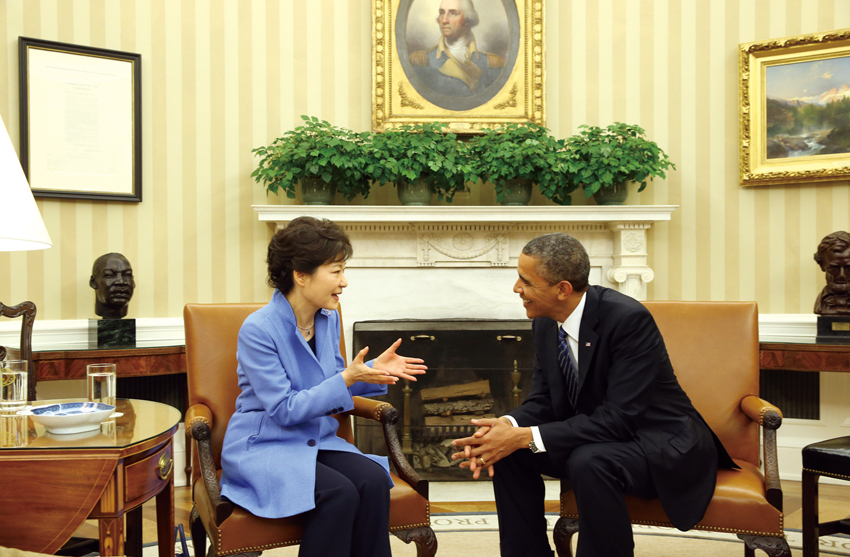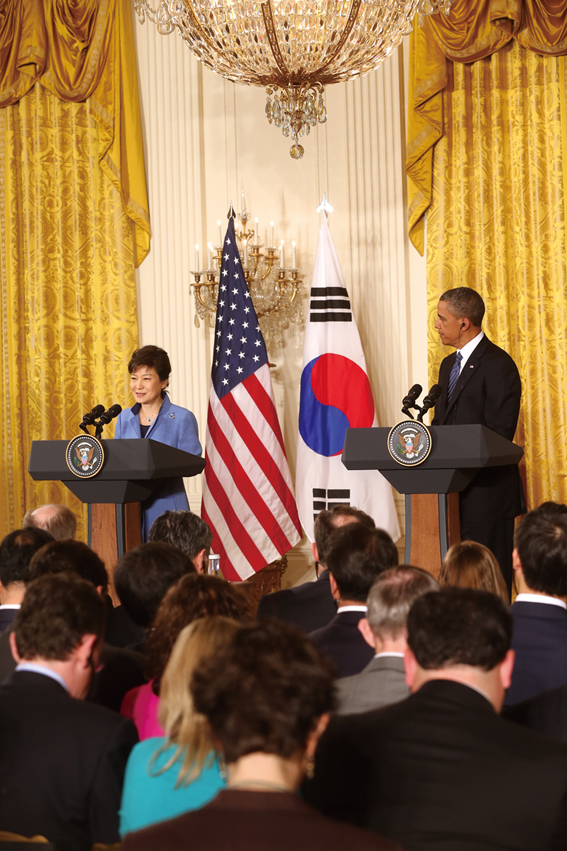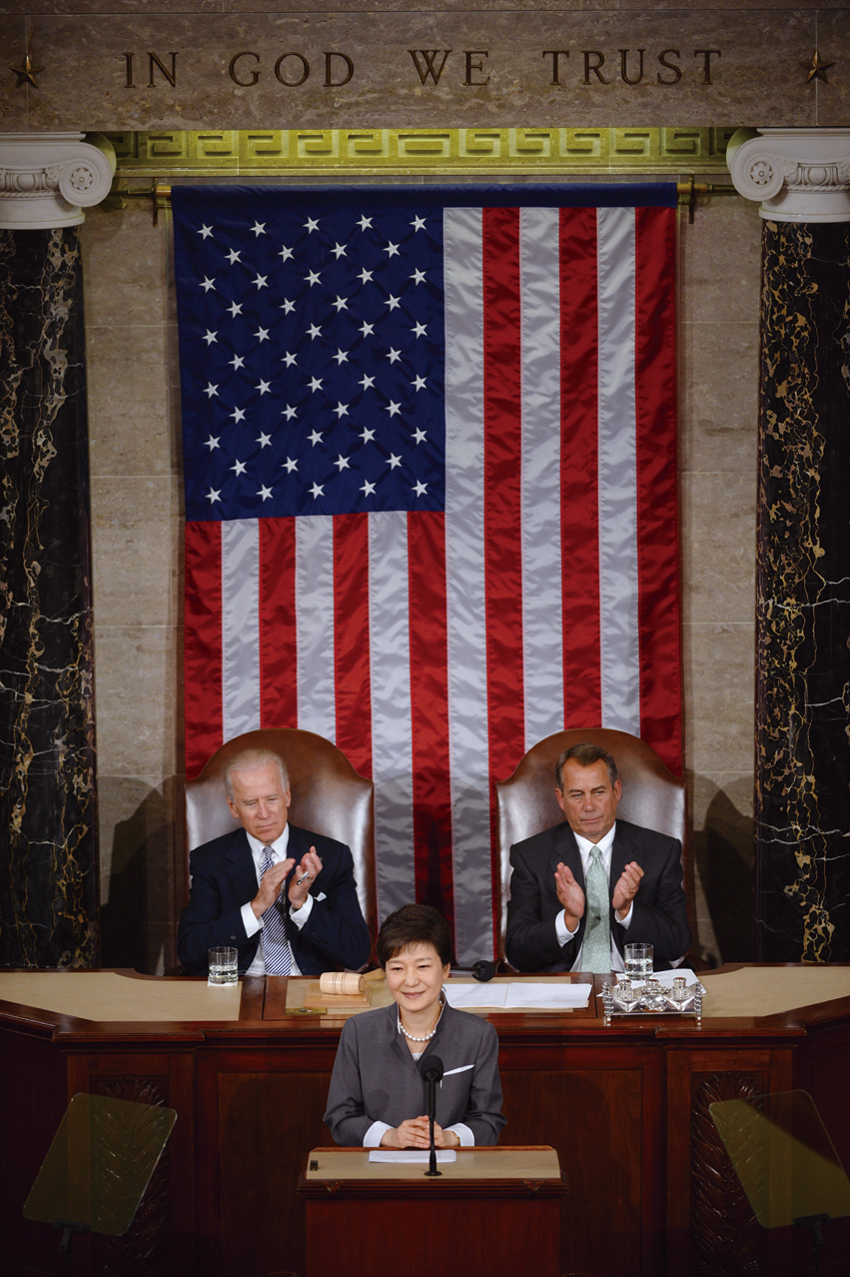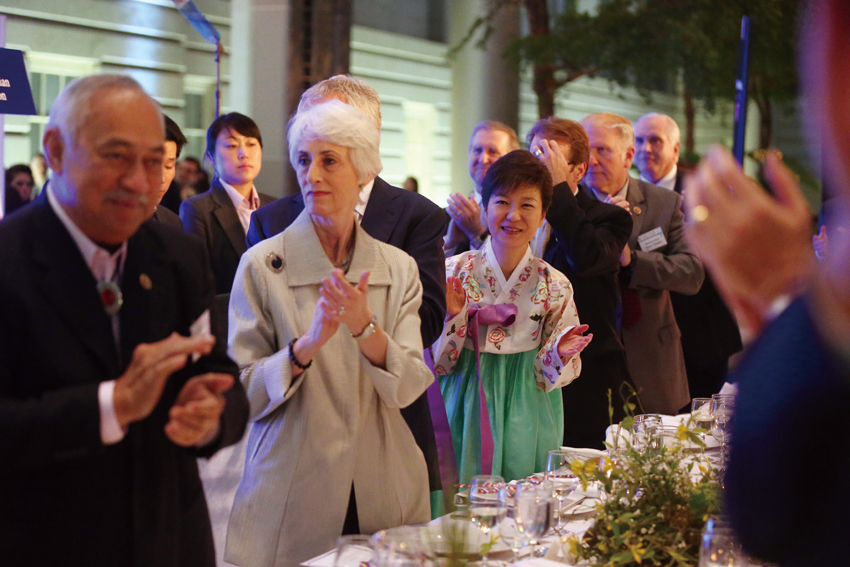Park-Obama Further Fortifies Already Strong ROK-U.S. Alliance
The heads of state agree during their summit to take decisive actions to smash North Korean provocations, but leave door open for talks

Korean President Park Geun-hye and U.S. President Barack
Obama held their first summit talks in Washington on May 7 and agreed to
further cement their alliance.
The Korea-U.S. Summit held in Washington on May 7 local time between Presidents Park Geun-hye and Barack Obama has further strengthened the already strong Korea-U.S. alliance, signaling what kind of deadly retaliation North Korea would get for its provoca
The two Chief Executives met in the Oval Office at the White House for their first summit amid an amicable atmosphere, and they agreed on taking stern measures against any of North Korea’s provocations against them or their allies, although they agreed to leave the door open for talks with the reclusive communist nation. The U.S. president supported President Park’s basic “confidence-building process in Northeast Asia including North Korea” during their meeting, which lasted for 75 minutes including 45 minutes of lunch time following a 30 minute meeting.
The two top leaders also adopted a joint declaration during their summit taking into account that this year marks the 60th anniversary of the two countries’ diplomatic relations. The declaration involved North Korea’s nuclear arms, realistic cooperative measures between the two allies, the issues in N.E. Asia, cooperation on world affairs, the transfer of war-time military command, and the amendment of the Korea-U.S. nuclear agreement, among other pertinent issues between the two countries, Presidential Spokesman said in his news briefing on the Presidential Summit in Washington.

President Park Geun-hye is at a joint media conference with U.S.
President Barrack Obama after their Summit
Meeting at the White House on May 7.
The spokesman said the two top leaders reaffirmed their unwavering support for the strategic ties between Korea and the U.S., the maintenance of the joint bilateral defense posture, and the further development of a comprehensive strategic alliance during the summit meeting.
The two presidents also reconfirmed the steady and frequent joint policy measures against North Korea, including stern joint actions if needed to deal with North Korean provocations, such as those they have been waging in recent days, and at the same time they agreed to keep doors open for talks under President Obama’s support for the confidence-building process on the Korean Peninsula.

President Park Geun-hye gives her speech at the
joint session of the U.S. Congress on May 8.
They also agreed that no concessions will be given to North Korea if it continues to conduct nuclear weapons tests, like the third nuclear bomb test, and the closure of the Gaeseong Industrial Complex in Gaeseong, North Korea, where hundreds of South Korean firms have plants employing North Korean workers.
In the meantime, President Park, during her speech delivered in English at a joint session of the U.S. House and Senate on May 8, called on the U.S. to support her vision to forge a multi-national mechanism for peace and cooperation in Northeast Asia. She hailed the Korea-U.S. alliance as the lynchpin of a reunited Korea, the future Northeast Asian order, and the two countries cooperation to address insecurity and poverty around the world. She also proposed to turn the demitarized zone between South and North Korea into an ecological park open to the world as a symbol for peach on the Korean Peninsula as well as in the world. She got a huge round of applause as she made the proposal.
The first female Chief Executive delivered these messages in her speech at the joint session of the U.S. Congress and at the gala dinner to commemorate the 60th anniversary of the Korea-U.S. alliance on the evening of May 7. She became the sixth Korean president in history to address the joint U.S. Congress.
“Building on the extraordinary accomplishments of the last 60 years, we are determined to embark on another shared journey toward peace on the Korean Peninsula, toward cooperation in northeast Asia, and finally, toward prosperity around the world,” Park said in her 30 minute speech, referring to the summit talks with President Obama the day before. Her speech was interrupted around 40 times by applause. She singled out the four current members of Congress who served during the Korean War °™ Rep. John Conyers, Rep. John Rangel, Rep. Sam Johnson, and Rep. Howard Coble. Each congressman stood as Park acknowledged them and received loud applause for their service. “Gentlemen my country thanks you,” she said.
Park said the Korea-U.S. alliance should reach beyond the Korean Peninsula and build a mechanism for peace and cooperation to serve the cause of peace and development in the region. “But it will be firmly rooted in the Korea-U.S. alliance,” she said, adding the dialogue could start on softer issues such as the environment, disaster relief, nuclear safety and counter-terrorism with possible participation of North Korea, if they are willing.
The South Korean president also said the alliance could deal with such international issues as terrorism, nuclear non-proliferation, disaster relief and the global financial crisis. “Together, we will help spread the universal values of freedom, human rights, and the rule of law. We will march together to take on global challenges °™ from fighting poverty to tackling climate change and other environmental issues,” she said.
Park also called for Korea’s need to reprocess spent uranium fuel rods in the nuclear power plants for civilian purposes. She said Korea needs a modernized mutually beneficial successor to the two nation’s existing civil nuclear agreement.
At the dinner on May 7 to commemorate the 60th anniversary of the Korea-U.S. diplomatic relations, the President Park declared that the Korea-U.S. alliance will be the cornerstone for the unfettered and reunited Korean Peninsula.
Attending the official dinner in Washington were some 400 American guests, including former Peace Corp. members who served in Korea, former and incumbent U.S. government officials, members of American academia, business leaders, and Korean War veterans. Prior to the dinner, Park met with U.S. Defense Secretary Chuck Hagel and his wife.
Park also was the guest of honor at the Korea-U.S. Business Roundtable and a luncheon hosted by the U.S. Chamber of Commerce at the Willard InterContinental Hotel on May 8 in Washington where she met with prominent U.S. business leaders including GM Chairman Daniel Akerson; CEO Marilyn Hewson of Lockheed Martin; Stan Gale, chairman of Gale and Co.; Dennis Muilenburg, executive vice president of Boeing; Paul Jacobs, chairman of Qualcomm and also chairman of the Korea-U.S. Business Council; Steve Van Andel, chairman of Amway and vice chairman of the U.S. Chamber of Commerce; and Maurice Greenburg, former chairman of the American International Group, among some 170 U.S. business executives among the participants.
Among the 51 Korean businessmen who accompanied President Park were Huh Chang-soo, chairman of the Federation of Korean Industries,; Sohn Kyung-shik, chairman of the Korea Chamber of Commerce and Industry,; Han Duck-soo, chairman of the Korea International Trade Association,; Park Byung-won, chairman of the Federation of Banks,; Samsung Group Chairman Lee Kun-hee,; Hyundai Motor Chairman Chung Mong-koo,; LG Group Chairman Koo Bon-moo,; Chairman Kim Chang-keun, of the SK SUPEX Committee,; Lotte Group Chairman Shin Dong-bin,; POSCO Chairman Chung Joon-yang,; Hanjin Group Chairman Cho Yang-ho,; Doosan Group Chairman Park Yong-man,; LS Group Chairman Koo Ja-yeol,; Kumho-Asiana Group Chairman Park Sam-koo,; Daelim Industrial Vice Chairman Lee Hae-uck,; Kyobo Life Insurance Chairman Shin Chang-jae,; Samyang Chairman Kim Yoon,; Toyang Moolsan Chairman Kim Hee-yong.; Fashion Group Hyungji Chairman Choi Byoung-oh,; Hana Financial Group Chairman Kim Jung-tae,; Shinhan Financial Group Chairman Han Dong-woo,; and KDB Financial Group Chairman Hong Ky-ttack.
Park told the U.S. business leaders that Korea is still an attractive country for foreign direct investments and the occasion would help with mutual understanding between the business leaders of Korea and the United States and strengthen their comprehensive economic cooperative relations.
At the luncheon, GM Chairman Akerson said his company will go ahead with its plan to invest $8 billion in Korea over the next five years, despite the North Korean threats, sticking to its decision made earlier.

President Park Geun-hye attends a Korea-U.S.
Business Roundtable and a luncheon hosted by the U.S.
Chamber of Commerce at the Willard InterContinental Hotel on
May 8 in Washington.
The president concluded her U.S. visit with a meeting on her government’s major policies, especially the creative economy with economic experts from Korea and the United States at the Getty Museum Fine Arts Hall in Los Angeles on May 9.
Park said in her opening speech of the meeting that the creative economy can be achieved when creativity and the power of thinking are mixed with science and technology and information communication technology (ICT), which will lead to a fusion among industry and culture. It is the private sector that will lead the movement and the government will build a safety net for them so that they can restart and pick up the challenge where they left off if they failed with their ideas and be reimbursed amply under such an environment created by the government.
She toured the museum with Museum Director Timothy Potts to view the works of Peter Paul Rubens, especially his work on a “Male in a Korean Traditional Costume.”
President Park kicked off her schedule in Washington, D.C. with a visit to the Korean War Memorial and toured the facilities in the park including a wall where the names of over 25,000 U.S. soldiers who died during the Korean War were inscribed. The president and her entourage returned to Seoul on May 10.
